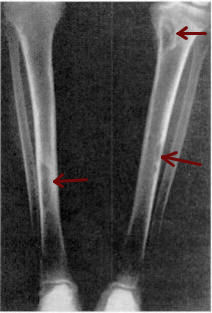Osteitis fibrosa cystica

Editor-In-Chief: Prab R Tumpati, MD
Obesity, Sleep & Internal medicine
Founder, WikiMD Wellnesspedia &
W8MD's medical weight loss NYC, sleep center NYC
Philadelphia medical weight loss and Philadelphia sleep clinics
| Osteitis fibrosa cystica | |
|---|---|

| |
| Synonyms | Von Recklinghausen's disease of bone |
| Pronounce | N/A |
| Specialty | N/A |
| Symptoms | Bone pain, fractures, skeletal deformities |
| Complications | Hypercalcemia, kidney stones, osteoporosis |
| Onset | Typically in adults |
| Duration | Chronic |
| Types | N/A |
| Causes | Hyperparathyroidism |
| Risks | Parathyroid adenoma, parathyroid hyperplasia |
| Diagnosis | Blood test, X-ray, bone scan |
| Differential diagnosis | Osteoporosis, Paget's disease of bone |
| Prevention | N/A |
| Treatment | Parathyroidectomy, bisphosphonates |
| Medication | Calcimimetics, vitamin D |
| Prognosis | Good with treatment |
| Frequency | Rare |
| Deaths | N/A |
Other names[edit]
Osteitis fibrosa cystica; Hyperparathyroidism - osteitis fibrosa; Brown tumor of bone

Definition[edit]
Osteitis fibrosa is a condition of bones when they become abnormally weak and deformed due to a complication of hyperparathyroidism.
Parathyroid glands[edit]
The parathyroid glands are 4 tiny glands in the neck. These glands produce parathyroid hormone (PTH). PTH helps control calcium, phosphorus, and vitamin D levels in the blood and is important for healthy bones.
Causes[edit]
Excessive parathyroid hormone (hyperparathyroidism) can lead to increased bone breakdown, which can cause bones to become weaker and more fragile.
Osteoporosis[edit]
Many people with hyperparathyroidism eventually develop osteoporosis.
Pathophysiology[edit]
- Not all bones respond to PTH in the same way.
- Some develop abnormal areas where the bone is very soft and has almost no calcium in it and this is osteitis fibrosa.
- In rare cases, parathyroid cancer causes osteitis fibrosa.
- Osteitis fibrosa is now very rare in people who have hyperparathyroidism who have good access to medical care.
- It is more common in people who develop hyperparathyroidism at a young age, or who have untreated hyperparathyroidism for a long time.
Symptoms[edit]
Osteitis fibrosa may cause bone pain or tenderness. There may be fractures (breaks) in the arms, legs, or spine, or other bone problems. Hyperparathyroidism itself may cause any of the following:
- Nausea
- Constipation
- Fatigue
- Frequent urination
- Weakness
Management[edit]
- Investigations include blood tests show a high level of calcium, parathyroid hormone, and alkaline phosphatase (a bone chemical).
- Phosphorus level in the blood may be low.
- X-rays may show thin bones, fractures, bowing, and cysts.
- Teeth x-rays may also be abnormal.
- A bone x-ray may be done.
- People with hyperparathyroidism are more likely to have osteopenia (thin bones) or osteoporosis (very thin bones) than to have full-blown osteitis fibrosa.
Treatment[edit]
Most of the bone problems from osteitis fibrosa can be reversed with surgery to remove the abnormal parathyroid gland(s). Some people may choose not to have surgery, and instead be followed with blood tests and bone measurements. If surgery is not possible, medicines can sometimes be used to lower calcium level.
Complications[edit]
Complications of osteitis fibrosa include any of the following:
- Bone fractures
- Deformities of bone
- Pain
- Problems due to hyperparathyroidism, such as kidney stones and kidney failure
Prevention[edit]
Routine blood tests done during a medical checkup or for another health problem usually detect a high calcium level before severe damage is done.
|
|
|
| Parathyroid disease | ||||||
|---|---|---|---|---|---|---|
|
| Bone and joint disease | ||||||||||||||||||||
|---|---|---|---|---|---|---|---|---|---|---|---|---|---|---|---|---|---|---|---|---|
|
Ad. Transform your life with W8MD's Budget GLP-1 injections from $49.99


W8MD offers a medical weight loss program to lose weight in Philadelphia. Our physician-supervised medical weight loss provides:
- Weight loss injections in NYC (generic and brand names):
- Zepbound / Mounjaro, Wegovy / Ozempic, Saxenda
- Most insurances accepted or discounted self-pay rates. We will obtain insurance prior authorizations if needed.
- Generic GLP1 weight loss injections from $49.99 for the starting dose of Semaglutide and $65.00 for Tirzepatide.
- Also offer prescription weight loss medications including Phentermine, Qsymia, Diethylpropion, Contrave etc.
NYC weight loss doctor appointmentsNYC weight loss doctor appointments
Start your NYC weight loss journey today at our NYC medical weight loss and Philadelphia medical weight loss clinics.
- Call 718-946-5500 to lose weight in NYC or for medical weight loss in Philadelphia 215-676-2334.
- Tags:NYC medical weight loss, Philadelphia lose weight Zepbound NYC, Budget GLP1 weight loss injections, Wegovy Philadelphia, Wegovy NYC, Philadelphia medical weight loss, Brookly weight loss and Wegovy NYC
|
WikiMD's Wellness Encyclopedia |
| Let Food Be Thy Medicine Medicine Thy Food - Hippocrates |
Medical Disclaimer: WikiMD is not a substitute for professional medical advice. The information on WikiMD is provided as an information resource only, may be incorrect, outdated or misleading, and is not to be used or relied on for any diagnostic or treatment purposes. Please consult your health care provider before making any healthcare decisions or for guidance about a specific medical condition. WikiMD expressly disclaims responsibility, and shall have no liability, for any damages, loss, injury, or liability whatsoever suffered as a result of your reliance on the information contained in this site. By visiting this site you agree to the foregoing terms and conditions, which may from time to time be changed or supplemented by WikiMD. If you do not agree to the foregoing terms and conditions, you should not enter or use this site. See full disclaimer.
Credits:Most images are courtesy of Wikimedia commons, and templates, categories Wikipedia, licensed under CC BY SA or similar.
Translate this page: - East Asian
中文,
日本,
한국어,
South Asian
हिन्दी,
தமிழ்,
తెలుగు,
Urdu,
ಕನ್ನಡ,
Southeast Asian
Indonesian,
Vietnamese,
Thai,
မြန်မာဘာသာ,
বাংলা
European
español,
Deutsch,
français,
Greek,
português do Brasil,
polski,
română,
русский,
Nederlands,
norsk,
svenska,
suomi,
Italian
Middle Eastern & African
عربى,
Turkish,
Persian,
Hebrew,
Afrikaans,
isiZulu,
Kiswahili,
Other
Bulgarian,
Hungarian,
Czech,
Swedish,
മലയാളം,
मराठी,
ਪੰਜਾਬੀ,
ગુજરાતી,
Portuguese,
Ukrainian


